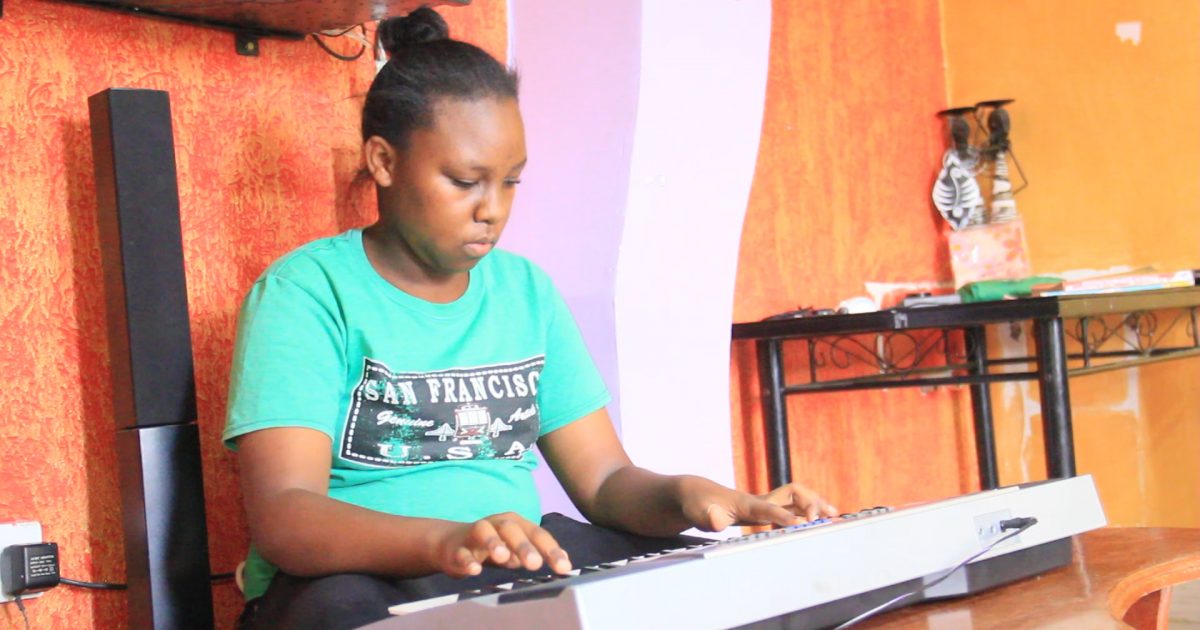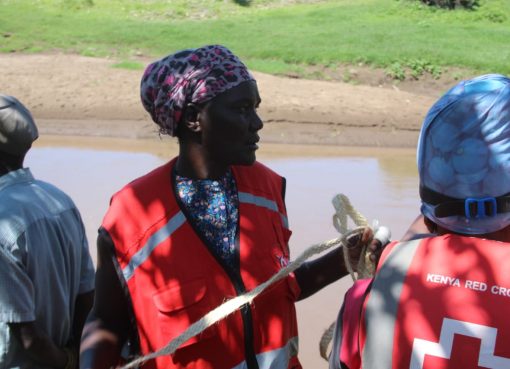Her mellow voice, crisp articulation and command of the English language while performing a rendition of Allan Walker’s popular number, “Sing me to sleep”, sends revelers at a wedding reception party into frenzied dancing.
The teenager’s beautiful diction and great ability to tell stories with her songs are replicated when she does a cover copy of Joseph Salim’s 1976 gospel hit ‘Ngukinyukia O Kahora’ (I will steadily walk) while skillfully strumming her box guitar.
At the age of only thirteen years Tracy Wambui is already a star, burning with unbridled passion and determined to make it big in the music industry.
And when she introduces a Luyia song, ‘Mukangala’, the hall erupts in wild rapture. And her audience doesn’t disappoint even with the fast-paced dance moves by Jacob Luseno. Wambui hits the notes that sound just like the original one.
‘Mukangala’ tells the story of a mischievous garden boy who instead of doing his domestic duties assumes the position of his boss and mimics the things he does. In his boss’ absence Mukangala wears his employer’s suits and acts all mighty.
Wambui is no stranger to bigwigs in showbiz and events’ organisers in Nakuru County and its environs.
The Standard seven pupil at Lions Primary School in Nakuru cannot remember how many times she has performed at music festivals, concerts, galas and private events in Nakuru, Nyeri, Nairobi and Kiambu Counties since she was 9 years old.

Wambui’s career as a part-time musician started in early 2016 when her mother Ms Rachael Kibui purchased for her a box guitar, a laptop and a piano. She never studied music and has learned everything she knows by self-exploration.
The budding musician offers that while she is more versatile in compositions and playing the guitar, her mother who has been her greatest mentor, was better in melody, vocals and arrangements.
Her compositions advise people, encourage the youth and educate the society. “A lot of great talent in the Kenyan music scene is going unnoticed or unappreciated. More often than not, I think that our musical talent is limited to a few mainstream musicians.
The fact that many young artists are underrated despite the hard, tedious work they put into their art deeply disheartens me,” states Wambui.
Wambui who aspires to become a lawyer describes herself as a sanguine adding that her biggest musical influence has been Allan Walker and country music idol Dolly Parton.
The teenager who is grateful for her parent’s strict upbringing and their receptiveness of her idea of delving into music is optimistic that the newly launched Competence-Based Education Curriculum will tap and nurture talents among young Kenyans.
“We used to have Music, Arts and Crafts education in primary school. These were removed from the education system. The artists who were prolific at the time did not pass their skills onwards. There was no mentorship at all.
As Disco Jockeys became influential they controlled radio shows and television shows, playing whomever they liked. Soon some musicians started offering DJs financial inducements to play their compositions transforming the whole arrangement into a corrupt cartel-like system. So many talents were wasted. Nevertheless am optimistic that CBC will cure the situation,” she states.
The core of CBC which was rolled out three years ago is equipping the learner with the ability to apply knowledge, skills and values taught in school. It is therefore a learner-centered system geared to improving the ability of students to use what they have learnt in school to solve life problems.
She adds “Whereas the 7-4-2-3 and 8-4-4 systems prepared students for traditional careers like medicine, law, engineering, teaching and so on, CBC is heavy on talent-oriented disciplines like sports, art, music as well as non-traditional vocations that are often shunned but require unique skill-sets,”
Wambui indicates that local radio stations should support Kenyan artists by playing more of their music adding that Nigeria, South African and Tanzanian content is currently dominating Africa due to supportive legislation and their enforcement by their respective governments.
“The legislation in Tanzania supports their music because their local airwaves give them 96 per cent playtime. That does not happen here in Kenya. I would say 90 per cent of the music played in Kenya is from other African Countries, Europe and beyond,” she laments.
Her mother Ms Racheal Muthoni feels that CBC is distinctly innovative compared to previous systems, as it seeks to shape responsible citizens by inculcating values like patriotism, integrity, peace and social justice while identifying and nurturing individual pupils’ talents in areas of music, sports, arts among others.
She says unlike the 7-4-2-3 and 8-4-4 systems that focused primarily on vocational skills and knowledge for the job market, CBC goes a step further to inculcate skills to enable learners make positive and meaningful contributions to the community.
“This gives opportunities to learners with special needs to also acquire competencies and skills at their own pace to enable them to participate in socio-economic development of our society.
Other than citizenship, other valuable competencies under the new curriculum include communication, critical thinking, problem-solving, creativity and digital literacy. These 21st-century skills are all geared to enhancing the ability of learners to engage in pursuits like entrepreneurship as well as social and technological innovation,”
Ms Muthoni calls on parents to be keen in identifying and nurturing talents of their children rather than discouraging them from pursuing their passion either in arts or sports.
She explains that all children have various talents that do not necessarily reflect those of their parents and that it was crucial to provide a range of opportunities for them so that any hidden talents can emerge and blossom.
“You can do this by introducing them to different topics, games, skills and activities, and helping them to pursue them.
Praise and encouragement will go a long way to developing your child’s recognised talents. Let her know you’re proud of her abilities and show an interest in the subject of her passion whether or not you share it,” she counsels.
Loice Macharia, a family friend observes that though Kenyans are talented musicians they must change from being copycats and get original. According to her many musicians have been aping the Western beat.
“It is one thing to have musical talent but that is not all what matters for you to succeed. You need to get a good production stable, a good manager or music adviser and a good promoter.
You also need goodwill among your fans besides having a vision. At the same time, learn how to brand yourself and above all, learn to leave it all to God,” advises Macharia.
By Anne Mwale and Dennis Rasto





